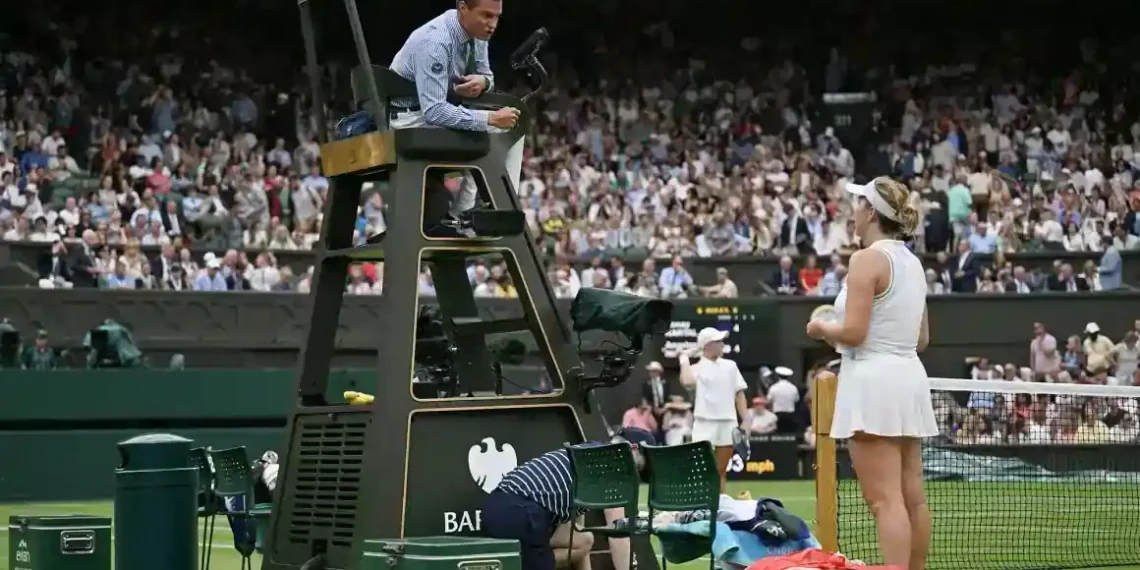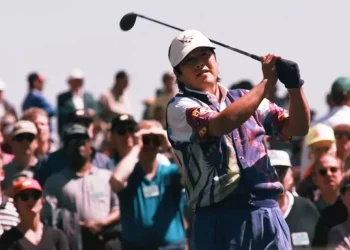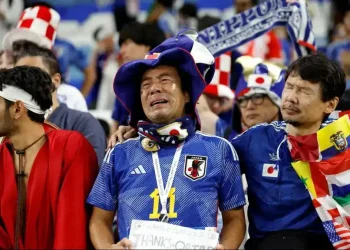Controversial Line Call Sparks Outrage at Wimbledon
Wimbledon organizers have issued a formal apology after a critical error in the tournament’s new electronic line-calling (ELC) system impacted a fourth-round match between Russia’s Anastasia Pavlyuchenkova and Britain’s Sonay Kartal on Sunday.
During the match, a missed “out” call on a crucial point sparked confusion and controversy on Centre Court. The automated Hawk-Eye system, which fully replaced human line judges this year, failed to register a clearly out shot—leading to a point being replayed instead of awarded, much to Pavlyuchenkova’s frustration.
In response, the All England Lawn Tennis & Croquet Club (AELTC) acknowledged the error and announced immediate changes: operators will no longer be able to manually deactivate the ball-tracking system.
System Failure Disrupts Key Game
The incident occurred during the first set when Kartal sent a backhand long. Pavlyuchenkova, thinking the point was over, stopped playing. However, the system failed to make an “out” call, and no intervention came from the umpire or line-calling technology.
Chair umpire Nico Helwerth paused play after the Hawk-Eye audio feed stated “stop, stop,” prompting visible confusion from both players and the crowd. Helwerth then contacted technical support by phone and later informed the audience that the system had been “unable to track the last point,” which was subsequently replayed.
Kartal capitalized on the replay, winning the point and breaking Pavlyuchenkova’s serve to take a 5-4 lead.
At the changeover, an irate Pavlyuchenkova told the umpire:
“You took the game away from me… They stole the game from me. They stole it.”
Hawk-Eye Deactivation Blamed on Human Error
A post-match investigation by Wimbledon officials confirmed that the Hawk-Eye system had been manually deactivated in error by the operators. The AELTC said Helwerth was unaware the system wasn’t functioning during those points.
In a statement to CNN, tournament organizers said:
“While the source of the issue was human error, this error cannot now be repeated due to the system changes we have made.”
The ELC system’s functionality depends on coordination between the Hawk-Eye operators, a Review Official, and the technology itself. According to officials, that harmony was disrupted during Sunday’s match.
Officials emphasized that Helwerth followed protocol by replaying the point once it was clear the system had failed.
Pavlyuchenkova Questions Automation’s Role in Tennis
Despite going on to win the match 7-6(3), 6-4 and securing a spot in the quarterfinals, Pavlyuchenkova was still visibly shaken post-match. She described the situation as “confusing” and questioned whether the point should have been replayed at all.
“If anything like that happens in a very important moment of the match, I think we should have a wire system like in football,” she said. “Then it’s clear for everybody and we can move on right away instead of just guessing.”
She also criticized the increasing reliance on automation in tennis officiating:
“That’s why we have a chair umpire… Otherwise, let’s just play without them and have everything automatic. I think we are losing a little bit of the charm of actually having human beings.”
Player Frustration Grows Over Automated Line-Calling
The use of automated line-calling at Wimbledon 2025 has been met with mixed reactions from players across the tournament.
British stars Emma Raducanu and Jack Draper have voiced concerns over the system’s reliability, with Raducanu describing it as “dodgy.” Swiss player Belinda Bencic noted that the system has become a frequent topic in locker room conversations.
While similar technology is already used at the Australian Open and U.S. Open, Wimbledon’s full transition away from human line judges marks a significant shift in tradition—and one that is drawing increasing scrutiny.
Wimbledon Officials Vow Better Safeguards
In their statement, Wimbledon officials reaffirmed their confidence in Hawk-Eye’s accuracy but admitted that this incident revealed a critical flaw in operational control.
“We have apologized to the players involved… We’ve fully reviewed our processes and made the appropriate changes.”
By removing the ability to manually disable the tracking system, tournament organizers hope to prevent similar issues in the future.
As debate continues around technology’s place in tennis, Sunday’s controversy may prove to be a defining moment in Wimbledon’s effort to modernize the sport—raising important questions about the balance between innovation and human judgment on the court.
This article was rewritten by JournosNews.com based on verified reporting from trusted sources. The content has been independently reviewed, fact-checked, and edited for accuracy, neutrality, tone, and global readability in accordance with Google News and AdSense standards.
All opinions, quotes, or statements from contributors, experts, or sourced organizations do not necessarily reflect the views of JournosNews.com. JournosNews.com maintains full editorial independence from any external funders, sponsors, or organizations.
Stay informed with JournosNews.com — your trusted source for verified global reporting and in-depth analysis. Follow us on Google News, BlueSky, and X for real-time updates.














